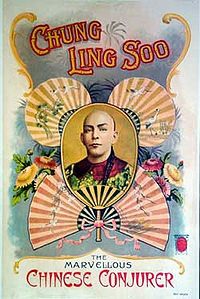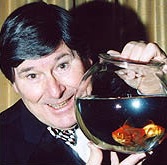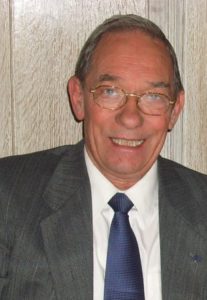Ali Bongo M.I.M.C.
8th December 1929 – 8th March 2009
Ali Bongo was a British comedy magician who performed an act in which he was known as the “Shriek of Araby”. Born as William Oliver Wallace in Bangalore, India where his father was serving as a Sergeant Major with the 1st Battalion of the Queen’s Own Royal West Kent Regiment. He spent his early years on a British station in Trimulgherry, Secunderabad, going to Britain with his mother at the age of seven.
After Bongo’s father had ended his army service, the family moved to Sutton Valence in Kent and he won a scholarship to Sutton Valence School, leaving at 16 to begin his career as an entertainer. His time in the National Service was spent with the Royal Army Pay Corps. He worked for Harry Stanley’s Unique Magic Studio and was manager of the magic department on Hamleys toy shop in London’s Regent Street.
He created his Shriek of Araby character with a cod oriental costume (robes, golden curly-toed slippers, horn-rimmed spectacles and a headgear that incorporated a fez and a turban) and took the name Ali Bongo from a character he had created for a youth club pantomime he had co-written and appeared in while in his teens. The original character had sung a song which began: “My name is Ali Bongo and I come from Pongo, pong-tiddley-pongo land.” Among his later magic catch-phrases were “Uju Buju Suck Another Juju”, “Aldy Bority Phostico Formio”, “Hocus Pocus Fishbones Chokus”. He made his British TV debut on The Good Old Days in 1965 on a bill topped by Tommy Trinder.
Bongo wrote many books on magic, many containing tricks of his own. He also illustrated them in his instantly recognizable style. He acted as magic consultant for many plays, opera, ballets and TV shows including [David Nixon]’s Magic Box, The David Nixon Magic Show for Thames Television and The Paul Daniels Magic Show for the BBC. Ali Bongo was the presenter of the Ali Bongo’s Cartoon Carnival, which featured himself and his assistant Oscar. It aired on UK TV BBC1 on Saturdays between 23 October and 18 December 1971, a total of nine episodes.
Bongo was featured in an episode of Children’s TV show Rainbow, appeared in the science-fiction show The Tomorrow People in the serial “Revenge of Jedikiah” and had a slot in Zokko. He also acted as the magical advisor on the TV show Dr Who and the 70s cult series, Ace of Wands. His legendary ability for devising tricks and illusions and solving magical problems inspired the TV writer, David Renwick, to create a character who was a magician’s assistant and amateur sleuth in the series Jonathan Creek. Bongo was magical adviser to the series.
Bongo joined The Magic Circle in 1960 and, two years later was made a Member of The Inner Magic Circle. He won The Magic Circle Magician of the Year in 1972, the Carlton Comedy Award in 1983 and the David Berglas Award in 1991. He served twice as vice-president of The Magic Circle before being elected president on 8 September 2008.
Rt. Rev Peter Fox A.I.M.C.
Magical bishop starts new Norwich adventure
Wrestling giant bats and being held at gunpoint are all in a day’s work for a bishop who plays the banjo and is a fully paid up member of the magic circle.
And after four years in the wilderness of Papua New Guinea, the Rt. Rev. Peter Fox is sure his new post as Interim Vicar of Lakenham and Tuckswood in Norwich will be no less of an adventure.
The 53 year-old moves from his position as Anglican Bishop of Port Moresby in Papua New Guinea where he served for four years.
Bishop Peter, who first moved to Norfolk when he was seven years old, has previously been curate of Wymondham and a group of parishes near Fakenham and views the appointment as a bit of a family reunion.
He said: “We already have two sons living in Norfolk – David, 23, who works in Norwich and John, 19, who is studying at UEA.
“It was very hard because you can only take leave every two years when you are an Anglican Bishop so I could only see them every two years.”
The bishop and his wife Angelique returned this summer with their youngest son Daniel, 14, who moved with his parents to the island north of Australia.
Bishop Peter says he will always look back with fond memories on his time in PNG which has become a second home. “I will really miss the people,” he said. “We have some great friends out there and it was an amazing honour to be chosen to be their bishop.
“I had first gone out there in 1979 and made many good friends, but I returned to marry Angie in 1981 and then we moved out together. I had no idea I had made such an impression on the people I met there. I still used to visit them when I was working over here but I couldn’t believe it when they asked me. I never dreamed I would be a bishop. “Bishops are supposed to play classical music on an organ. I listen to country music, play the banjo and am a member of the magic circle.”
Chung Ling Soo
(1861–1918).
 Chung Ling Soo was the stage name of American stage magician William Ellsworth Robinson. He is famous for dying when his bullet catch trick went wrong. During his early career, William Ellsworth Robinson called himself Robinson, the Man of Mystery. To increase his allure with a touch of exoticism, he changed his name to Chung Ling Soo and took his show to Europe. He took the name as a variation of a real Chinese stage magician – Ching Ling Foo – and performed many of the tricks that Foo had made famous.
Chung Ling Soo was the stage name of American stage magician William Ellsworth Robinson. He is famous for dying when his bullet catch trick went wrong. During his early career, William Ellsworth Robinson called himself Robinson, the Man of Mystery. To increase his allure with a touch of exoticism, he changed his name to Chung Ling Soo and took his show to Europe. He took the name as a variation of a real Chinese stage magician – Ching Ling Foo – and performed many of the tricks that Foo had made famous.
Chung Ling Soo maintained his role as a Chinese man scrupulously. He never spoke onstage and always used an interpreter when he spoke to journalists. Only his friends and other stage magicians knew the truth.
In 1905 in London, when both Soo and Foo were performing in different theatres, they developed a public feud—possibly a publicity stunt—referring to themselves as the only “Original Chinese Conjurer” and the other as an impostor. Foo challenged Soo to perform his tricks but did not show up at the appointed time. Whether this was by design is unknown.
Soo’s most famous illusion—partly because of his death while performing it—was called “Condemned to Death by the Boxers”. In this trick Soo’s assistants, sometimes dressed as Boxers, took two guns to the stage. Several members of the audience were called on the stage to mark a bullet that was loaded into one of the guns. Attendants fired the gun at Soo, and he seemed to catch the bullets from the air and drop them on a plate he held up in front of him.
On March 23, 1918 the trick went tragically wrong when Soo was performing in the Wood Green Empire, London. His last words were spoken on stage that moment, “Oh my God. Something’s happened. Lower the curtain.” It was the first (and last) time in 19 years that William “Chung Ling Soo” Robinson had spoken English in public.
Soo was taken to a nearby hospital, but he died the next day. Soo’s wife explained the nature of the trick, and the inquest judged the case “accidental death. Some conspiracy-minded theorists suggest that the death was not accidental. In 1955 US stage magician Jack Clarkson claimed that Soo was in debt, that his wife was having an affair with his agent, and that the incident was an elaborate form of suicide. Others have suggested instead that the agent manipulated the gun so that Soo would be killed. Neither theory is supported by solid evidence His life inspired the opera ‘The Original Chinese Conjuror’ in 2006, by Hong Kong born British composer, Raymond Yiu.
John Derris MIMC
 John Derris was born in London, and first performed magic at the age of fourteen in a scout show, continuing with performances in concert parties and RAF revues during his National Service. Later on he mixed with a group called the “DG’s” (Jack Avis, Bobby Bernard, Alex Elmsley, Ted Danson, Roy Walton and Al Koran) and became interested in what were then called “pocket tricks.” His work was widely published in Abra, The Pentagram, Tops, Phoenix and
John Derris was born in London, and first performed magic at the age of fourteen in a scout show, continuing with performances in concert parties and RAF revues during his National Service. Later on he mixed with a group called the “DG’s” (Jack Avis, Bobby Bernard, Alex Elmsley, Ted Danson, Roy Walton and Al Koran) and became interested in what were then called “pocket tricks.” His work was widely published in Abra, The Pentagram, Tops, Phoenix and
other magic publications. John created a number of effects including “Trilogy” which sold extensively in Europe and the U.S. also a trick called “Pen-i-Pin” – the penetration of an examined coin with three hat pins.
John had a career in advertising and started his own international advertising agency which prevented any involvement in magic. He says that for a period of 25 years he never wore a thumb tip and never read Abra! He married Jack Avis’s sister, claiming it was the only way that he could get Jack to show him the mechanics of the second deal!
On retirement he became a born-again magician and was introduced to the new world of corporate and restaurant magic by close friend Bob Read. Since that time John has worked extensively in Britain, Europe and Japan for many leading corporate organisations and at many venues including The Dorchester, Grosvenor House, Castle Howard, NEC, The Belfry, The House of Lords and on The Orient Express. Recently he was invited to appear in a TV spectacular celebration in Istanbul with Whitney Houston.
He is the author of Come a Little Closer, a book of close-up magic that celebrates the friendship of his early group who are still close friends after 50 years. He also co-authored Vis a Vis with Jack Avis.
Headquarters
Since 1998, the Magic Circle headquarters building in central London has been available for meetings and corporate entertainment. It has been voted best unusual venue by the hospitality industry. A virtual tour of the building and information are available online. The Magic Circle headquarters houses a theatre, museums, libraries, a dining room, a clubroom and bars.
Membership
 Membership of the Magic Circle requires the applicant to undergo an interview and to pass a performance exam to show proficiency and skill. The alternative to the usual performance is a written thesis relating to magic. Members of the Society use the letters M.M.C. after their name.
Membership of the Magic Circle requires the applicant to undergo an interview and to pass a performance exam to show proficiency and skill. The alternative to the usual performance is a written thesis relating to magic. Members of the Society use the letters M.M.C. after their name.
Members may take a further examination to achieve the degree of associate of the Inner Magic Circle. The designation A.I.M.C. shows this higher membership. The A.I.M.C. degree can also be attained through thesis, and in rare cases, examinees taking the M.M.C. exam are awarded the A.I.M.C. degree. Those who attain an A.I.M.C. degree as a result of a performance examination are given the A.I.M.C. with Silver Star.
Within the society, there are a number of members never exceeding 300 known as the Inner Magic Circle. Full membership of the Inner Magic Circle is denoted by the letters M.I.M.C. after the member’s name. Membership of the Inner Magic Circle is by call of the society’s president.
About The Magic Circle
History
The Magic Circle was founded in 1905 after a meeting of 23 amateur and professional magicians at London’s Pinoli’s Restaurant. The first official meeting was at the Green Man public house in Soho, but meetings were later in a room at St George’s Hall (London), St George’s Hall in Langham Place, where David Devant and John Nevil Maskelyne were regularly seen. Devant became the first president of the Magic Circle, and in 1906, Maskelyne edited the first issue of The Magic Circular, a regular feature for members ever since.
1905: 23 magicians gather at Pinoli’s restaurant, London, to form the Magic Circle, swearing a pledge that prevents them discussing the methods of conjuring outside the circle
1909: David Devant, its founder and first president, is expelled for revealing secrets in a magazine.
1975: Prince Charles joins after performing a cup and ball trick.
1991: Women are admitted, after a campaign by Stacey Lee in the 1980s
1994: John Lenahan is expelled for exposing the three-card monte trick on television.
1998: The Circle moves to new purpose-built headquarters in Euston
2004: One member is expelled and three resign after their involvement in The Secrets of Magic, a show explaining the mechanics of tricks. 2005: The Magic Circle celebrates its centenary
Motto
The motto of the society is the Latin indocilis privata loqui, roughly translated as “not apt to disclose secrets”; Members give their word not to willfully disclose magic secrets other than to bona fide students of magic. Anyone breaking this or any other rule may be expelled.
Due to ill health I retired from Magic on the on the 26th April 2014 but will remains a member of The Magic Circle and attend when I can. It’s been a wonderful experience Thank you so much for all your very kind comments. Below are some of the messages received.
Just finished my last Magic Show It really was time to end, very sad for me but at least I finished on a high and very few mistakes. I will still keep my membership at The Magic Circle and attend when I can. I will keep some of my Magic collection in case any visitors request something, and will always have something in my pocket when out and about, Love to all.
Optiker Robert Holz: chapou, my good friend – you have well done
Linda Roberts: All the very best x
Jack Street: Best wishes Mick. I am still trying to work out the dancing spectacles.
Graham Frost: Well done Michael, you have brought pleasure to many!
Deb Ghinn: Sad for you Mick, but also so many wonderful memories I think?
Jill Mytton: I am so glad you went out on a high Michael and that you will keep your membership of the Magic Circle – it is has been such a big part of your life. I shall miss not seeing you at Maidenhead this year – that is if you are going! I shall be down under with Nicole. Lots of love to you my friend
Antje Matthiess: thank you for your Magic moments
Ruth G Bodek: How many years has it been, and do you have some photos to share?
Laurie Moffitt: Michael Gurr you will remain a legend.
Vicky Smith: This is very sad news, we have been so privileged to have seen a master at work. Love from all of us x
Dean Maudsley: Sad news mate but just think of all those smiles you have put on people faces over the years, including me.
Matthew Garrett: I enjoy your performances too, great seeing reactions when you reveal so many details about people that you couldn’t possibly know.